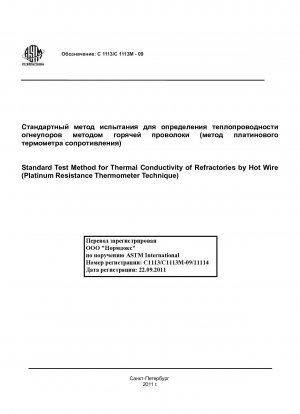ASTM C1113/C1113M-09
Standard Test Method for Thermal Conductivity of Refractories by Hot Wire (Platinum Resistance Thermometer Technique)
- Standard No.
- ASTM C1113/C1113M-09
- Release Date
- 2009
- Published By
- American Society for Testing and Materials (ASTM)
- Status
- Replace By
- ASTM C1113/C1113M-09(2013)
- Latest
- ASTM C1113/C1113M-09(2019)
- Scope
The k-values determined at one or more temperatures can be used for ranking products in relative order of their thermal conductivities.
Estimates of heat flow, interface temperatures, and cold face temperatures of single, and multi-component linings can be calculated using k-values obtained over a wide temperature range.
The k-values determined are “at temperature” measurements rather than “mean temperature” measurements. Thus, a wide range of temperatures can be measured, and the results are not averaged over the large thermal gradient inherent in water-cooled calorimeters.
The k-values measured are the combination of the k-values for the width and thickness of the sample, as the heat flow from the hot wire is in both of those directions. The water-cooled calorimeter measures k-value in one direction, through the sample thickness.
The test method used should be specified when reporting k-values, as the results obtained may vary with the type of test method that is used. Data obtained by the hot wire method are typically 10 to 30 % higher than data obtained by the water calorimeter method given in Test Method C 201
. 1.1 This test method covers the determination of thermal conductivity of non-carbonacious, dielectric refractories.
1.2 Applicable refractories include refractory brick, refractory castables, plastic refractories, ramming mixes, powdered materials, granular materials, and refractory fibers.
1.3 Thermal conductivity k-values can be determined from room temperature to 1500°C [2732°F], or the maximum service limit of the refractory, or to the temperature at which the refractory is no longer dielectric.
1.4 This test method is applicable to refractories with k-values less than 15 W/m·K [100 Btu·in./h·ft2·°F].
1.5 In general it is difficult to make accurate measurements of anisotropic materials, particularly those containing fibers, and the use of this test method for such materials should be agreed between the parties concerned.
1.6 Units8212;The values stated in either SI units or inch-pound units are to be regarded separately as standard. The values stated in each system may not be exact equivalents; therefore, each system shall be used independently of the other. Combining values from the two systems may result in non-conformance with the standard.
1.7 This standard does not purport to address the safety concerns, if any, associated with it''s use. It is the responsibility of the user of this standard to establish appropriate safety and health practices and determine the applicability of regulatory limitations prior to use.
ASTM C1113/C1113M-09 Referenced Document
- ASTM C134 Standard Test Methods for Size, Dimensional Measurements, and Bulk Density of Refractory Brick and Insulating Firebrick
- ASTM C201 Standard Test Method for Thermal Conductivity of Refractories
- ASTM C865 Standard Practice for Firing Refractory Concrete Specimens
- ASTM E691 Standard Practice for Conducting an Interlaboratory Study to Determine the Precision of a Test Method
ASTM C1113/C1113M-09 history
- 2019 ASTM C1113/C1113M-09(2019) Standard Test Method for Thermal Conductivity of Refractories by Hot Wire (Platinum Resistance Thermometer Technique)
- 2009 ASTM C1113/C1113M-09(2013) Standard Test Method for Thermal Conductivity of Refractories by Hot Wire lpar;Platinum Resistance Thermometer Techniquerpar;
- 2009 ASTM C1113/C1113M-09 Standard Test Method for Thermal Conductivity of Refractories by Hot Wire (Platinum Resistance Thermometer Technique)
- 1999 ASTM C1113-99(2004) Standard Test Method for Thermal Conductivity of Refractories by Hot Wire (Platinum Resistance Thermometer Technique)
- 1999 ASTM C1113-99 Standard Test Method for Thermal Conductivity of Refractories by Hot Wire (Platinum Resistance Thermometer Technique)
